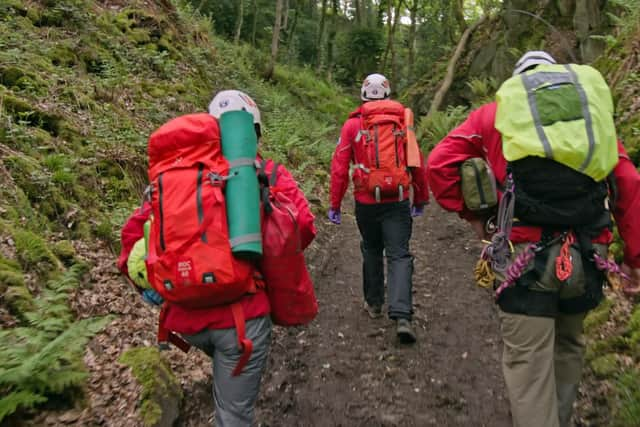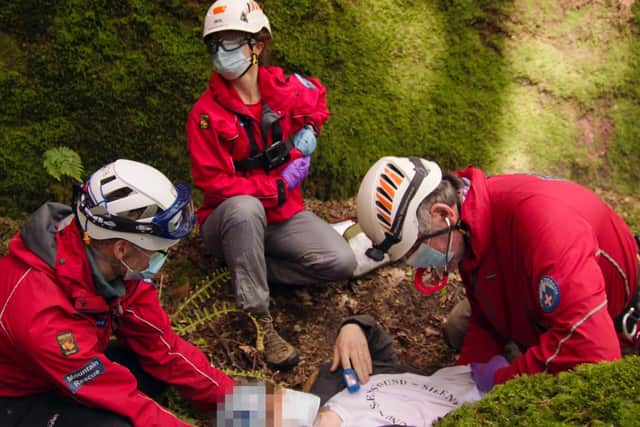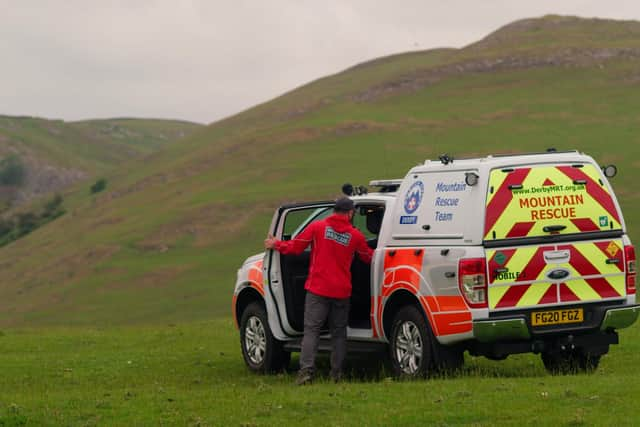Derbyshire mountain rescue team set to record busiest year on record following increase in call-outs
and live on Freeview channel 276
While Derby Mountain Rescue Team which respond to incidents in Shirebrook, Bakewell, Wirksworth, Darley Dale, Cromford, Carsington, Winster, Youlgreave, Ripley, Heanor, Ilkeston and Belper, usually receive call-outs to around 60 incidents in an average year – 2021 is set to be far higher.
So far the team, that are called to help walkers that have fallen, or experienced a medical emergency while climbing or assist the police in searching for missing people, have already attended 49 incidents this year.
Advertisement
Hide AdAdvertisement
Hide AdMountain rescuers predict it could be the busiest year on record, after a surge in call-outs following the easing of lockdown measures and with people opting for a staycation and exploring the countryside on their doorstep.


David O’Sullivan, who is the Derby Mountain Rescue Team press officer and also an operational volunteer, joined the team in 2021.
"I looked around for what activities and groups were around and stumbled across mountain rescue in the Peak District. I decided I would quite like to help out and applied and got in to join the team”, he said.
"There's a year and a half worth of training to get your coveted red jacket and then you are allowed out on the hill.”
Advertisement
Hide AdAdvertisement
Hide AdThe team work alongside the seven mountain rescue teams in the Peak District and are sometimes called out to other areas to assist in bigger rescue missions such as the search for April Jones, during the Carlisle and York Floods as well as responding to the Lockerbie air disaster.


Most frequently, the Derby mountain rescuers are called out to incidents in the Thorpe Cloud, Dovedale and Milldale areas.
David, who has recently joined the team’s water section said: "We've seen an increase in the number of call outs now lockdown restrictions have eased.
"It was a bit hard to tell in the beginning of Covid because we don't know when call outs are going to come, we don't plan for them, they are incidents that happen.
Advertisement
Hide AdAdvertisement
Hide Ad"There could be five in a day, there could be none for two months, we have no ability to plan for that. When Covid started because people were out and about and still enjoying the Peak District and with that still comes the potential for an accident to happen.


"But looking back on it now, we definitely have been very busy.
"I haven't plotted the number but it is very likely that this will be our busiest year.”
Around 50% of the incidents the mountain rescue team assist with are known as immediate call-outs, such as helping fallen climbers, while 20% are helping with missing person searches.
Advertisement
Hide AdAdvertisement
Hide AdRecently, rescuers were called to help a paraglider that had crashed in Hartington.
David added: “There's no new particular type of incident where somebody has suddenly taken up or new sport that we are seeing problems with.
"But it is probably, most likely due to home vacations, people staying in the UK and everybody still wants to get out and enjoy the outdoors.
"My friends and family are all staycationing so it makes sense that the numbers are higher and people going out and enjoying the Peak District and unfortunately that results in incidents happening.”
Advertisement
Hide AdAdvertisement
Hide AdThe trained operational volunteer expressed concern about the number of people who have drowned in recent weeks, by swimming in quarries and open water during the hot weather.
Emergency services have urged people not to swim or jump into open water as the water remains cold and could cause your body to go into cold water shock, while hidden rocks can also pose a threat to swimmers and even claim their life if they get tangled and trapped.
While Derby Mountain Rescue Team have not been called out to respond to the incidents, David highlighted how helping people who have got caught in trouble in the water is the sort of emergency they could be asked to assist with.
He added: "No one is doing these things maliciously, everyone is just trying to have a nice time in the countryside and ends up in a bit of a problem.”
Advertisement
Hide AdAdvertisement
Hide AdDavid, who also works as an IT consultant running his own e-commerce company, admitted that juggling his volunteer role alongside full-time work can be ‘quite strange’ at times, adding that giving a casualty morphine on the side of a hill is not in his normal day job remit.
But he praised the training provided to mountain rescuers before joining the team, along with mental health support from charities such as Mind to help volunteers cope with difficult scenarios such as in the case of finding someone who has committed suicide.
David said: "I think it is a testament really to all the volunteers, it is not just a punch of have-a-go heroes, we are highly trained, we meet national standards for our qualifications.
"In many cases we are as trained, at least in the area we are working in, as the paramedics who are there, or the police, we have search techniques and first aid skills.
Advertisement
Hide AdAdvertisement
Hide Ad"When there is an incident the incident itself takes over and your training kicks in.
"It's a bit of a stereotype to say it but that is really what happens and it isn't particularly scary or worrying, it is all about that casualty and that patient at that time and making sure they get to a definitive care point, a hospital usually and making sure they are ok.”
He encouraged hikers and walkers to prepare themselves with appropriate footwear, a map, a compass, water and a change of clothes before setting off on a climb in the Peak District to prevent them from getting into trouble.
He added: “Before you go, think about what you are going to be doing and come up with some kind of plan around that.
Advertisement
Hide AdAdvertisement
Hide Ad"If you are going to head up a very steep hill it is probably not a good idea to be wearing flip flops.
"There is nothing really that is particularly difficult to think about, it just needs that little bit of preparation before you go to think actually it is going to be a hot day, I am going to need some water, I am going to an area I don't normally go to, I am going to take a map and a compass.
"Lots of people in the UK don't know how to use a map and a compass, there is obviously a whole discussion about people using mobile phones for navigation.
"There is great technology but if you don't know how a map works and which way north is then that is a bit of a problem.”